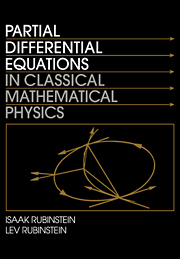
-
Select format
-
- Publisher:
- Cambridge University Press
- Publication date:
- 05 June 2012
- 28 January 1994
- ISBN:
- 9781139173896
- 9780521558464
- Dimensions:
- Weight & Pages:
- Dimensions:
- (247 x 174 mm)
- Weight & Pages:
- 1.094kg, 696 Pages
You may already have access via personal or institutional login
Book description
The unique feature of this book is that it considers the theory of partial differential equations in mathematical physics as the language of continuous processes, that is, as an interdisciplinary science that treats the hierarchy of mathematical phenomena as reflections of their physical counterparts. Special attention is drawn to tracing the development of these mathematical phenomena in different natural sciences, with examples drawn from continuum mechanics, electrodynamics, transport phenomena, thermodynamics, and chemical kinetics. At the same time, the authors trace the interrelation between the different types of problems - elliptic, parabolic, and hyperbolic - as the mathematical counterparts of stationary and evolutionary processes. This combination of mathematical comprehensiveness and natural scientific motivation represents a step forward in the presentation of the classical theory of PDEs, one that will be appreciated by both students and researchers alike.
Reviews
‘There is no doubt that this is a work of considerable and thorough erudition.’
Source: The Times Higher Education Supplement
Contents
Metrics
Altmetric attention score
Full text views
Full text views help Loading metrics...
Loading metrics...
* Views captured on Cambridge Core between #date#. This data will be updated every 24 hours.
Usage data cannot currently be displayed.
Accessibility standard: Unknown
Why this information is here
This section outlines the accessibility features of this content - including support for screen readers, full keyboard navigation and high-contrast display options. This may not be relevant for you.
Accessibility Information
Accessibility compliance for the PDF of this book is currently unknown and may be updated in the future.


